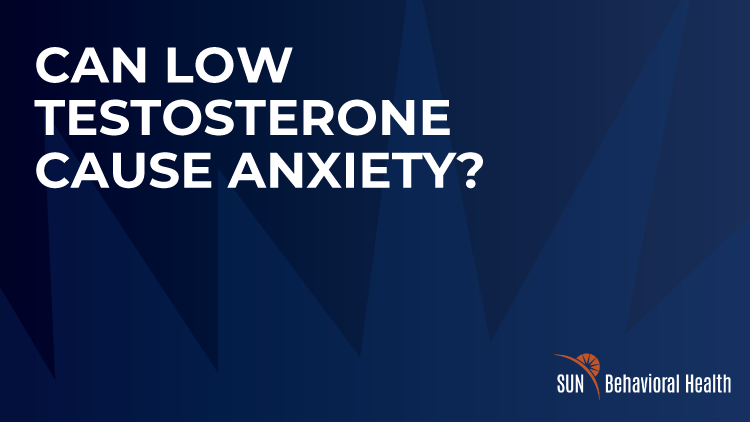Services

If you’re 40 or older and you’re experiencing new or worsening anxiety, any number of things could be to blame. Things like a sedentary lifestyle, the loss of a job, a divorce, or even high stress levels can all contribute to a decline in mental health. If none of these things sound right to you, your testosterone levels could be the culprit. The team of experts at SUN Behavioral Health Delaware knows why this might be happening and how to help. Let’s talk more about testosterone and anxiety.
Testosterone isn’t something that’s talked about too much, but it plays a key role in human physiology. This is the primary sex hormone that promotes things like muscle and bone mass in men and the repair of reproductive tissues in women. As men and women age and their testosterone levels drop, they may notice changes in body hair, muscle mass, erectile function, sex drive, and – you guessed it – mood. Low testosterone (low T) has been linked to increased stress, depression, and anxiety because of the role it plays in mood regulation.
Low testosterone often goes undiagnosed in middle-aged adults (especially women) because it's mistaken for signs of aging. Things like fatigue, low libido, weight gain, and hair loss are all symptoms that can be caused by both aging and low T.
Testosterone is known as a neuroactive steroid, which means it can affect the function of your central nervous system (CNS). Because our CNS controls the way we learn, feel, and think, it makes sense that dysregulation in testosterone levels would cause dysregulation in our moods.
Testosterone levels can affect our moods in indirect ways, too. For example, low testosterone can cause weight gain or hair loss – two things that can impact self-esteem. Testosterone deficiency can also cause fatigue or low energy levels, which can lead to a loss of motivation for work or spending time with friends. Low libido caused by low testosterone could also cause anxiety or depression if it’s getting in the way of your relationships.
An anxiety disorder is not the same as an anxious mood. An anxious mood will often happen alongside an event like the loss of a job or financial hardship. An anxiety disorder will interfere with your life, making it difficult to function. Some common symptoms of adult anxiety include:
If you’re experiencing these symptoms, how can you tell if they’re because of low levels of testosterone? If low testosterone is causing your anxiety, you’ll probably see other accompanying symptoms. Here are just a few that you might notice:
Not everyone experiences a steep decline in their testosterone as they age. Low T levels can happen in both men and women, though it happens more commonly in men. Around 30% of the males who struggle with low T are obese while another 25% have Type 2 diabetes. The main cause of low T in women is natural aging or menopause. Women can also experience low testosterone if they had a hysterectomy or if they’ve struggled with eating disorders.
Let’s talk about some other common risk factors for low T:
There are tests that can confirm whether or not you’re living with low T. A total testosterone level blood test, a prolactin blood test, and a luteinizing hormone blood test are all common options. If you feel like this is what’s happening, speak with your doctor about your next steps. Fortunately, treatment is available.
Even with treatment, low T doesn’t go away overnight. Your anxiety needs to be treated, too. No matter what’s going on inside your body, anxiety treatment can bring you some much-needed emotional relief.
Treatment for anxiety usually consists of talk therapy, an inpatient or outpatient program, medication, or even a combination of these options. Talking to your doctor about your options is a great first step. They can refer you to a program or a facility like SUN Behavioral Delaware. Therapy can teach you how to create healthy coping strategies and take control of your anxiety. Mental health is just as important as physical health, and when it goes untreated it can cause larger problems.
At SUN Behavioral Health Delaware, we offer both inpatient and outpatient treatment options for adolescents and adults. We also offer group therapy and individual counseling. Reading about your options is a great first step. If you have any questions about treatment for anxiety disorder, call us today at 302-604-5600!
Testosterone is known as a neuroactive steroid, which means it can affect the function of your central nervous system (CNS). Because our CNS controls the way we learn, feel, and think, it makes sense that dysregulation in testosterone levels would cause dysregulation in our moods.
300-1,000 nanograms per deciliter is a normal testosterone level for men and 15-70 nanograms per deciliter is considered normal for women.
If you’re 40 or older and you’re experiencing new or worsening anxiety, any number of things could be to blame. Things like a sedentary lifestyle, the loss of a job, a divorce, or even high stress levels can all contribute to a decline in mental health. If none of these things sound right to you, your testosterone levels could be the culprit.